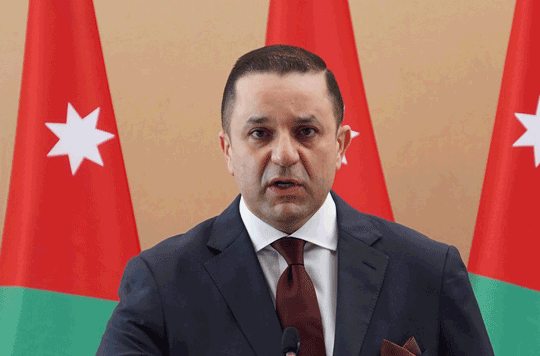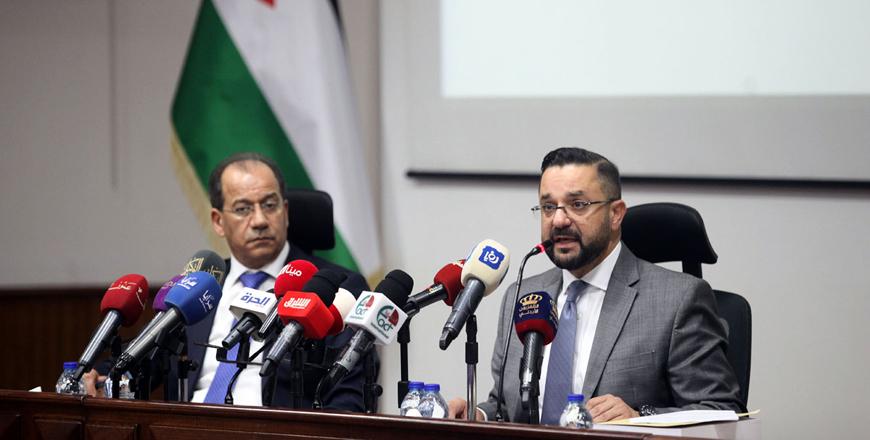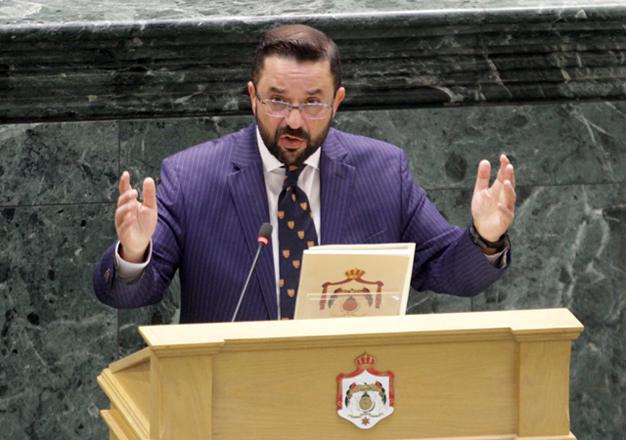You are here
Budget focuses on structural reforms, monetary, financial stability — Al-Ississ
By JT - Feb 14,2022 - Last updated at Feb 14,2022

Finance Minister Mohamad Al-Ississ speaks during a Lower House session on Monday (Petra photo)
AMMAN — The main elements of the economic policy in the next stage are based on implementing structural reforms that preserve financial and monetary stability, enhancing the competitiveness of the business environment, facilitating procedures, reducing costs of practicing businesses and production inputs and focusing on an economy based on technology and the Fourth Industrial Revolution, Finance Minister Mohamad Al-Ississ said on Monday.
Replying to lawmakers’ deliberations over the 2022 draft state budget and the 2022 draft budgets of independent public institutions, Al-Ississ said that the focus will be increasing and diversifying Jordanian exports and targeting new markets and benefitting from free trade agreements, in addition to implementing procedures that aim to remove defaults in the labour market, the Jordan News Agency, Petra, reported.
The minister said that the 2022 budget is “untraditional” in terms of the increases to the capital expenditure by 43.6 per cent and the decline of the public debt service for the first time in years.
He also said that the government has provided several financial alternatives with lower costs and replaced commercial loans with soft loans, referring to reducing and unifying customs fees in a way that some 93 per cent of imports are now subject to customs fees of five or zero per cent.
Al-Ississ also referred to “the success of the financial administration in protecting the Kingdom from the repercussions of the largest financial crisis” in recent times and preventing its effects on the financial stability. He stressed that Jordan’s credit classification did not drop during the pandemic.
He added that increasing the contribution of direct and fair taxation cannot be described as traditional procedures, where January revenues show that direct tax collection increase to 36 per cent of the total tax revenues up from 30 per cent in the same month of 2021.
The minister added that despite all these challenges, the national economy in 2021 managed to realise several positive indicators, where the real growth in the first three quarters of last year stood at 2.1 per cent compared with an economic recession of 1.5 per cent in the same period of 2020, which means a total of 3.6 per cent increase.
Stressing the “success” of the financial policy in reducing the structural deficit, Al-Ississ said that the 2021 budget deficit dropped by some JD453 million or 1.6 per cent of GDP, where the budget deficit constituted 5.4 per cent of GDP compared with some 7 per cent in 2020.
All these procedures will positively reflect on the Kingdom’s ability to adopt self-reliance, where the percentage of local revenues’ coverage of current expenditures will increase by 14 per cent to 88.4 per cent in 2022, compared with 74.4 per cent in 2020, he said.
As for efforts to enhance the Kingdom’s financial stability, the minister said that Jordan’s reserves of foreign currency in 2021 reached an unprecedented level of $18 billion, which can cover the Kingdom’s imports for more than nine months.
Regarding the MPs’ recommendations to support the health sector, Al-Ississ said that the sector during the pandemic received the government’s utmost attention, where the government, in the 2022 budget, increased allocations for the sector by JD177 million to JD1.133 billion compared with JD956 million in 2021.
He also said the government agrees with lawmakers’ views on the importance of supporting the tourism sector, noting that the government reduced the sales tax for hotels and tourist restaurants to the half, from 16 to 8 per cent, and allowed instalments of overdue amounts for 2019 to be paid without any fines or delayed interests, in addition to exempting tourist association from licensing fees and fines for 2020.
The minister said that the government agrees on the importance of supporting the energy sector and embarked on reviewing agreements on energy projects.
He also said that the government will enhance water security through implementing major projects in partnership with the private sector, pointing out that the government is about to float a tender for the national water carrier Aqaba-Amman project, which is a strategic sovereign scheme that aims to maintain the Kingdom’s water security.
Related Articles
AMMAN — Jordan's GDP is projected to grow by 2.7 per cent, as inflation is expected to narrow to 3.8 per cent in 2023, Finance Minister Moha
AMMAN — The government is seeking to accelerate economic growth next year, Finance Minister Mohamad Al-Ississ said on Sunday, noting that ca
AMMAN — The government on Monday announced the draft general budget for the fiscal year 2022, projecting public expenditures at JD10.0668 bi

















